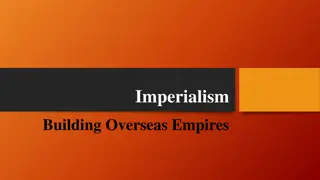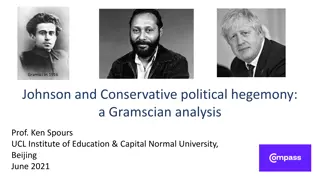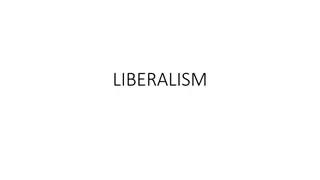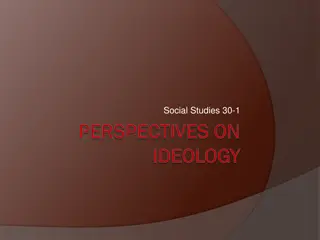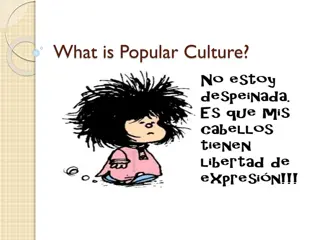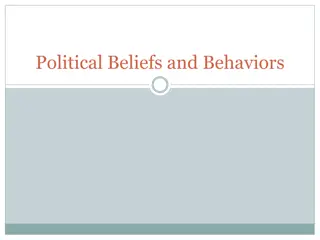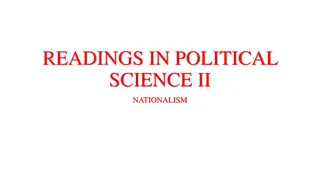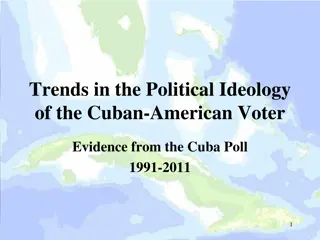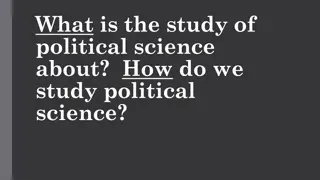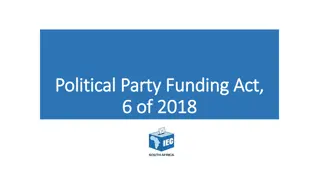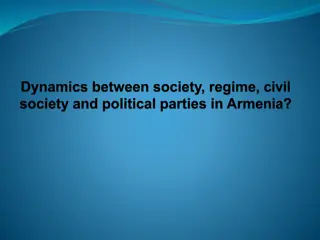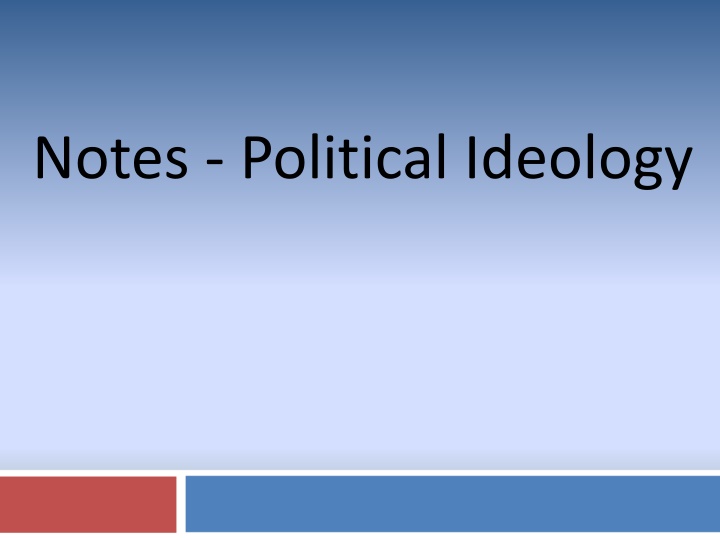
Political Ideologies and Economic Governance
Explore the spectrum of political ideologies from far left to far right, including liberalism, conservatism, socialism, and more. Learn about the economic principles underlying these ideologies, such as government regulation of the economy and the concepts of pure communism and pure capitalism. Dive into the perspectives of major political parties like Democrats and Republicans on capitalism and wealth distribution. Discover the varying beliefs in government intervention and laissez-faire capitalism.
Uploaded on | 1 Views
Download Presentation

Please find below an Image/Link to download the presentation.
The content on the website is provided AS IS for your information and personal use only. It may not be sold, licensed, or shared on other websites without obtaining consent from the author. If you encounter any issues during the download, it is possible that the publisher has removed the file from their server.
You are allowed to download the files provided on this website for personal or commercial use, subject to the condition that they are used lawfully. All files are the property of their respective owners.
The content on the website is provided AS IS for your information and personal use only. It may not be sold, licensed, or shared on other websites without obtaining consent from the author.
E N D
Presentation Transcript
Notes - Political Ideology Understanding political Ideologies economically (Economic Self-Governor) 1 3 Far Left = Far Right = 2 4 9 7 6 5 8 1. Left 2. Right 3. Liberal 4. Conservative
Notes - Political Ideology Understanding political Ideologies economically (Economic Self-Governor) Far Left = Pure Communism: Complete Government ownership and operation of all businesses. Far Right = Pure Capitalism: Complete Private ownership and operation of all businesses.
Notes - Political Ideology Understanding political Ideologies economically (Economic Self-Governor) 1 3 Far Left = Far Right = 2 4 9 7 6 5 8 5. Independents / Moderates / Centrists 6. Democrats 7. Socialists 8. Republicans 9. Libertarians
They favor 2 1 3 4 government regulation or control of the economy. 5 6 1. Much 2. Some 3. Little 4. Zero
They favor 2 1 3 4 government regulation or control of the economy. 5 6 5. They believe LESS in pure capitalism (free market capitalism, the free market economy, the market economy). They are less laissez-faire (French for "Let it be 6. They believe MORE in pure capitalism (free market capitalism, the free market economy, the market economy)They are more laissez-faire (French for "Let it be")
The Views of our two major parties, Republicans and Democrats (Very broadly speaking!) Democrats and Republicans Lets do Republicans First (Bottom RIGHT box) Capitalism: 1. Efficiently organizes the economy to provide consumers with what they want. Government rules and regulations only make the process less efficient. 2. Creates tremendous wealth for all of society. We all win. 3. Is usually fair. A. Talented hard working people will earn more. B. Lazy people will earn less, as it should be.
The Views of our two major parties, Republicans and Democrats (Very broadly speaking!) The Republican / Libertarian View of Capitalism: John Stossel s Greed (Go to last page of packet) http://www.youtube.com/watch?v=EGkEziYbcJo
The Views of our two major parties, Republicans and Democrats (Very broadly speaking!) Democrats and Republicans Now Democrats (Bottom Left Box on front page) Capitalism: 1. Organizes a nation s economy well, but without government regulations, business interests can be harmful to the public interest. 2. Creates tremendous wealth though too much of it goes to those at the top. 3. Is often unfair. Many hard-working talented people through no fault of their own are underpaid, overworked, or unemployed altogether.
The Views of our two major parties, Republicans and Democrats (Very broadly speaking!) The Democratic / Socialist View of Capitalism: Upton Sinclair s the Jungle (United Streaming World History: The Modern Era, Segment 3: Early Industrial America (Go to last page of packet) http://app.discoveryeducation.com/core:player/ view/assetGuid/D3257257-307E-4576-AC2D- 7C04F606F870
Where they stand on the issues Democrats/Liberals Republicans/Conservatives are more likely to favor Economic Issues Cutting Government Spending Republicans Pollution Regulations Democrats Raising the CAFE Standards (Corporate Average Fuel Efficiency) Democrats Tax Cuts to kill a recession Republicans
Where they stand on the issues Democrats/Liberals Republicans/Conservatives are more likely to favor Economic Issues Stimulus spending to kill a recession Democrats Privatizing Social Security Republicans A single payer healthcare system Democrats
Where they stand on the issues Democrats/Liberals Republicans/Conservatives are more likely to favor Economic Issues College Tuition Grants Democrats Lowering the Minimum Wage Republicans Union Rights Democrats
Understanding political parties ethically (Personal Self-Governor) Left 1. Right 2. Let s start on the right 1. They believe in traditional American (Judeo-Christian) moral values 2. They believe that moral values are a matter of personal choice.
Where they stand on the issues Democrats/Liberals are more likely to favor Moral Issues Allowing Gay Marriage Democrats Pro Choice rather than Pro Life Democrats School Prayer Republicans Republicans/Conservatives
Where they stand on the issues Democrats/Liberals are more likely to favor Moral Issues Allowing Desecration of the American Flag Democrats Nativity scenes in front of government buildings at Christmas time Republicans Intelligent Design Theory in Schools Republicans Republicans/Conservatives
So which ideology are you???!!!

